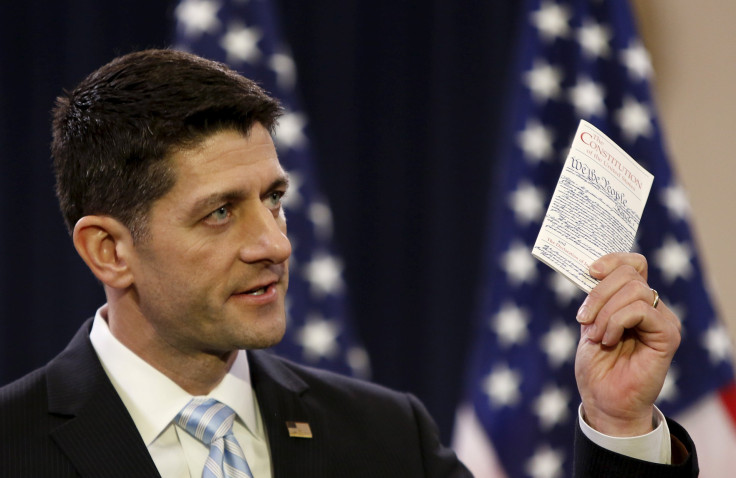What Is The First Amendment? Donald Trump Flag Burning, Free Speech Controversy Explained

President-elect Donald Trump has taken on Hillary Clinton, Kristen Stewart and Major League Baseball. Now, his latest foe might be the First Amendment to the United States Constitution.
Trump triggered a national discussion Tuesday morning when he tweeted, apparently while watching a Fox News segment about college students who set fire to a flag to protest his election earlier this month, that "nobody should be allowed to burn the American flag." "If they do, there must be consequences — perhaps loss of citizenship or year in jail!" he added.
His Twitter mentions immediately lit up with users pointing out that flag burning is legal, as it's considered a form of free speech and is therefore covered by the First Amendment — an opinion confirmed by the U.S. Supreme Court. Even the White House weighed in, with Press Secretary Josh Earnest telling reporters Tuesday that Trump's comment was "not the first thing that the president-elect has said or tweeted that President Obama disagrees with."
Like it or not, burning the American flag is free speech protected by the First Amendment https://t.co/crIdzDo2EP
— ACLU (@ACLU) November 29, 2016
Confused about the amendment and the laws that followed? Here's what you need to know:
The First Amendment to the Constitution was adopted as part of the Bill of Rights in 1791. It reads, "Congress shall make no law respecting an establishment of religion, or prohibiting the free exercise thereof; or abridging the freedom of speech, or of the press; or the right of the people peaceably to assemble, and to petition the Government for a redress of grievances."
The amendment's "freedom of speech" clause includes the right "to engage symbolic speech, (e.g., burning the flag in protest)," given the precedent set in two cases, according to the U.S. federal courts website. Those are Texas v. Johnson in 1989 and United States v. Eichman in 1990.
Texas v. Johnson concerned Gregory Lee Johnson, a man who set an American fire aflame outside of the 1984 Republican National Convention in a demonstration against then-President Ronald Reagan. He was arrested and later convicted under a Texas statute prohibiting people from desecrating venerated objects. Johnson appealed and lost, but when he took his case to the Texas Court of Criminal Appeals, he won. The Texas Court of Criminal Appeals ruled that Johnson's actions were "expressive conduct," according to Cornell University's Legal Information Institute.
The case then went to the Supreme Court, which, in a 5-4 decision, found that burning the flag fell under "symbolic speech" — and was protected by the First Amendment.
After Texas v. Johnson was settled, Congress passed the Flag Protection Act of 1989, aimed at punishing people who set fire to American flags. "Whoever knowingly mutilates, defaces, physically defiles, burns, maintains on the floor or ground, or tramples upon any flag of the United States shall be fined under this title or imprisoned for not more than one year, or both," it read, adding that disposing of worn flags was O.K.
When activists were arrested afterward for burning the flag and appealed to have their charges dropped, the Supreme Court again took up the case — this time, called United States v. Eichman. In 1990, the court struck down the Flag Protection Act, writing that "its asserted interest is related to the suppression of free expression and concerned with the content of such expression," according to legal database Oyez.
Congress has since tried to amend the Constitution but failed.
© Copyright IBTimes 2024. All rights reserved.






















